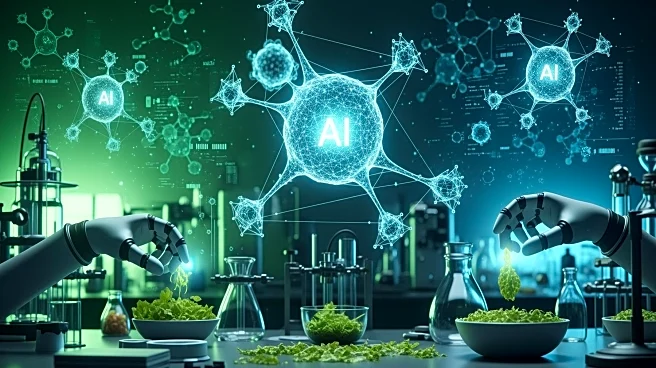What's Happening?
The Bezos Centre for Sustainable Protein and Microbial Food Hub, led by Rodrigo Ledesma-Amaro, is addressing the challenges faced by alternative proteins, particularly cultivated meat and precision fermentation
products, in reaching commercial markets. Despite advancements in plant-based alternatives, these sectors struggle with scaling and cost issues. Precision fermentation, which uses microorganisms to produce specific ingredients, faces hurdles in price reduction and requires more infrastructure and skilled personnel for upscaling. Meanwhile, cultivated meat, grown from cells in a lab, is limited in consumer access outside select countries due to regulatory barriers. The UK Food Standards Agency is easing regulations to accelerate market entry for these products.
Why It's Important?
The commercialization of alternative proteins is crucial for sustainable food production and reducing reliance on traditional animal agriculture, which has significant environmental impacts. Overcoming barriers such as cost and scaling can lead to wider consumer acceptance and availability, potentially transforming the food industry. Precision fermentation offers versatility in improving product quality without additives, while cultivated meat provides a more ethical and sustainable meat option. Successful commercialization could lead to significant shifts in consumer habits and industry practices, benefiting both the environment and public health.
What's Next?
Efforts to reduce costs and improve infrastructure for alternative proteins are ongoing, with increased research and funding needed. The UK Food Standards Agency's initiatives may serve as a model for other countries to follow, potentially speeding up regulatory processes globally. As these products become more accessible, consumer education and acceptance will play a critical role in their success. Companies in the sector are likely to focus on innovation and partnerships to overcome existing challenges and expand their market presence.
Beyond the Headlines
The development of alternative proteins raises ethical and cultural questions about food production and consumption. As these products become more mainstream, they may challenge traditional dietary norms and prompt discussions on food security and sustainability. The shift towards lab-grown and fermented foods could also impact agricultural economies and labor markets, necessitating policy adjustments and support for affected industries.









